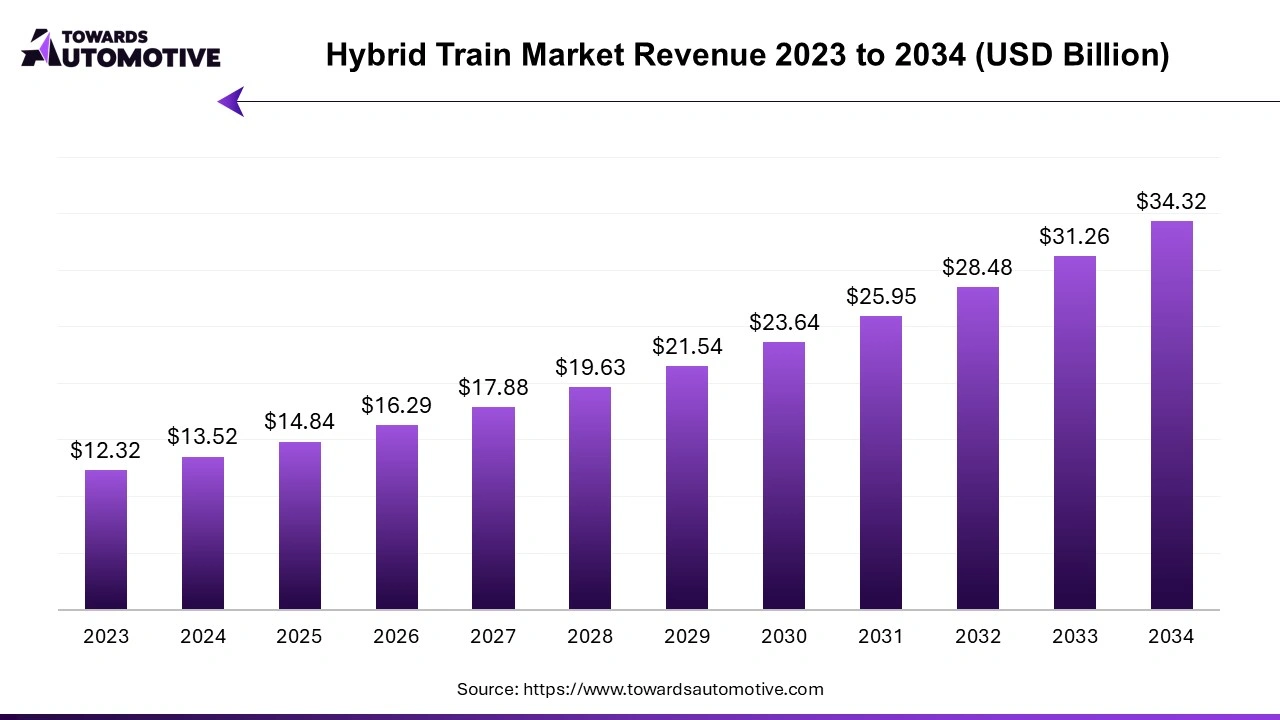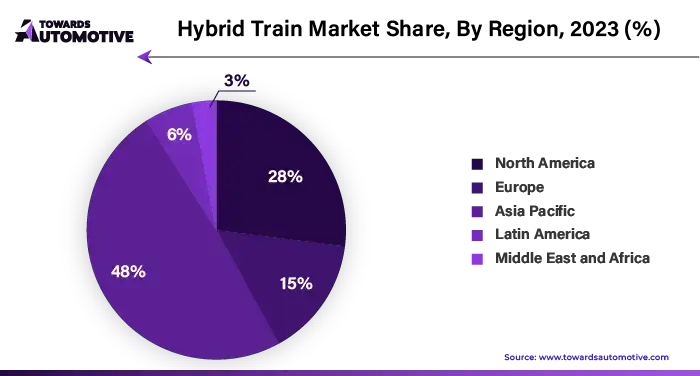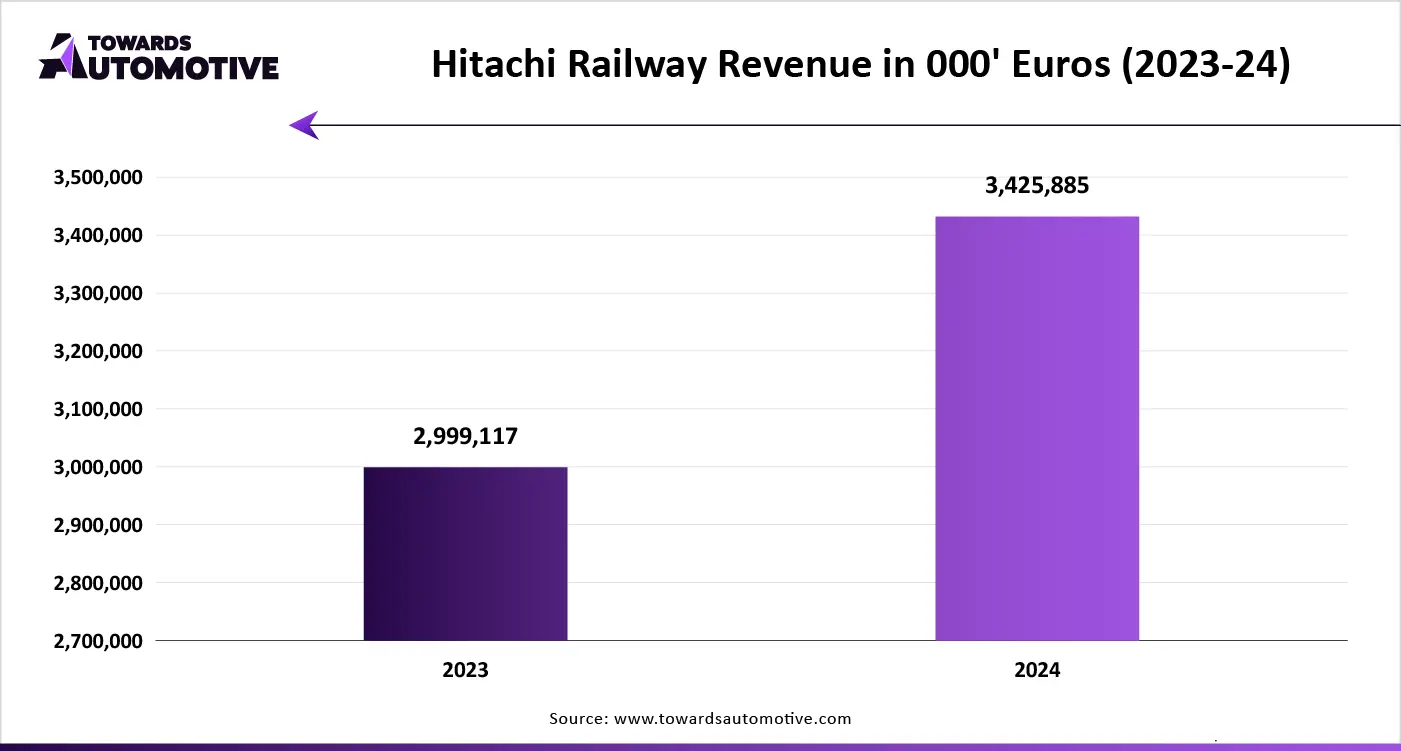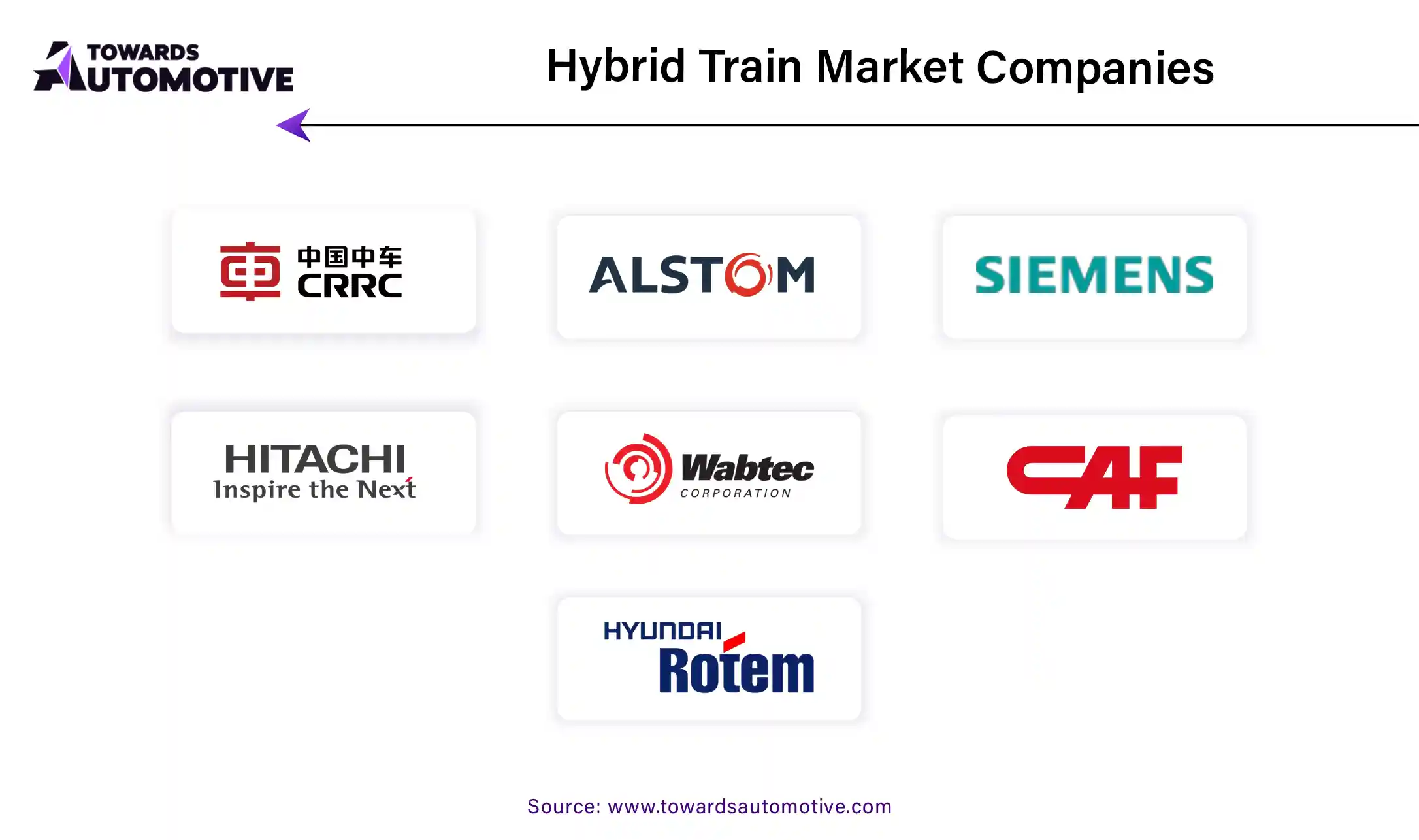October 2025
The hybrid train market is expected to increase from USD 14.84 billion in 2025 to USD 34.32 billion by 2034, growing at a CAGR of 9.76% throughout the forecast period from 2025 to 2034. The growing investment by government of several countries for strengthening the railway infrastructure along with technological advancements in the locomotive manufacturing sector is playing a vital role in shaping the industry in a positive direction.

Moreover, rising awareness of consumers towards adopting eco-friendly transportation solutions coupled with rapid investment by market players for developing hybrid trains has boosted the market growth. The research and developments related to heavy-duty train batteries is expected to create ample growth opportunities for the market players in the future.
The hybrid train market is a crucial segment of the railway industry. This industry deals in manufacturing and distribution of hybrid trains across the world. There are several types of trains developed in this sector comprising of electro-diesel trains, battery electric trains, hydrogen powered trains and some others. These trains are capable of attaining different speeds including below 100 km/h, 100-200 km/h, above 200 km/h and some others. It finds application in passenger transportation and goods delivery.
The increasing emphasis on adopting energy-efficient transportation solution in developed nations has boosted the market expansion. This market is expected to rise significantly with the growth of the transportation sector around the globe.
The major trends in this market consists of developments in locomotive industry, partnerships and government investments.
The locomotive industry is developing rapidly due to rapid technological advancements and rising investment by public-sector entities.
Numerous railway operators are partnering with the market players to deploy hybrid trains for reducing locomotive emission.
Government of numerous countries such as India, China, Japan, the U.S., France and some others are investing heavily for strengthening the railway infrastructure.
The electro-diesel segment dominated the market. The growing use of electro-diesel trains in the APAC region due to its lower ticket prices as compared to other modes of transportation has boosted the market expansion.
Additionally, the rising adoption of these trains in the logistics sector for transporting goods from one region to another coupled with technological advancements in electro-diesel engines is playing a crucial role in shaping the industrial landscape. Moreover, rapid investment by market players for developing powerful electro-diesel engines is expected to foster the growth of the hybrid train market.
The battery electric segment is expected to expand with a significant CAGR during the forecast period. The growing deployment of battery electric trains in several developed nations such as the U.S., Canada, Italy, Singapore and some others with an aim at reducing vehicular emission has driven the market expansion. Additionally, numerous government initiatives aimed at enhancing railway electrification coupled with rapid investment by battery companies for developing high-capacity batteries for trains is playing a crucial role in shaping the industrial landscape. Moreover, the increasing emphasis of locomotive companies on developing battery electric trains is expected to propel the growth of the hybrid train market.
The above 200 Km/h segment held the largest share of the market. The growing demand for high-speed trains in several countries such as Japan, China, Italy and some others has boosted the market expansion. Additionally, the rapid adoption of hybrid trains that can achieve a speed of more than 200 km/h by railway operators for long-distance commutes is expected to boost the growth of the hybrid train market.
The 100 - 200 Km/h segment is expected to rise with a considerable CAGR during the forecast period. The rising demand for cost-effective freight trains from the logistics sector to transport goods from one place to another has driven the market growth. Moreover, the increasing investment by locomotive brands for manufacturing railway engine that can deliver speeds of around 100 - 200 Km/h is expected to drive the growth of the hybrid train market.
The passenger segment led the market. The deployment of electric trains by railway operators for operating passenger transportation services has boosted the market expansion. Additionally, rapid investment by government of several countries for strengthening the passenger railway infrastructure is playing a vital role in shaping the industrial landscape.
Moreover, partnerships among locomotive brands and government for deploying hydrogen-powered trains to enhance passenger transportation is expected to drive the growth of the hybrid train market. The freight segment is expected to rise with a notable CAGR during the forecast period. The growing adoption of railway-based delivery services by e-commerce brands to operate in isolated regions has boosted the market expansion.
Additionally, numerous government initiatives aimed at developing freight corridors coupled with rising developments in railway logistics is playing a vital role in shaping the industrial landscape. Moreover, collaborations among freight operators and locomotive brands to deploy electric trains for reducing emission is expected to boost the growth of the hybrid train market.

Europe dominated the hybrid train market. The increasing adoption of hybrid trains in several countries such as Germany, Italy, France, Denmark, UK and some others has boosted the market expansion. Additionally, numerous government initiatives aimed at reducing vehicular emission coupled with rising consumer awareness to adopt sustainable transportation solutions is playing a vital role in shaping the industry in a positive direction. Moreover, the presence of numerous market players such as Siemens AG, Alstom SA, Talgo, Arriva Group and some others is expected to boost the growth of the hybrid train market in this region.
Asia Pacific is expected to expand with the fastest CAGR during the forecast period. The growing demand for high-speed hybrid trains in various nations such as China, Japan, Indonesia and some others has boosted the market growth. Additionally, rapid investment by government for strengthening the railway infrastructure coupled with collaborations among railway operators and locomotive brands for developing electric trains is contributing to the market in a positive manner. Moreover, the presence of various market players such as The Kinki Sharyo Co., Ltd., Hyundai Rotem Company, CRRC Corporation Limited and some others is expected to propel the growth of the hybrid train market in this region.
The hybrid train market is a rapidly developing industry with the presence of several dominating players. Some of the prominent companies in this industry consists of CRRC Corporation Limited; Alstom SA; Hitachi Rail STS; Wabtec Corporation; Construcciones y Auxiliar de Ferrocarriles; Siemens AG; Hyundai Rotem Company; Talgo; The Kinki Sharyo Co. Ltd. and some others. These companies are constantly engaged in providing transportation services based on autonomous vehicles and adopting numerous strategies such as acquisitions, collaborations, business expansions, joint ventures, launches, partnerships, and some others to maintain their dominance in this industry.


By Propulsion Type
By Application
By Speed
By Region
The small boats market size is calculated at $14.77 billion in 2024 and is expected to be worth $68.3 billion by 2034. The small boats market is growi...
The global bicycle saddle market, valued at USD 3.84 billion in 2024, is anticipated to reach USD 7.38 billion by 2034, growing at a CAGR of 6.75% ove...
The Jet Engines Market was valued at USD 78.19 bn in 2024 and is projected to reach USD 172.07 bn by 2034, growing at a CAGR of 7.83%. Asia Pacific cu...
October 2025
October 2025
September 2025
September 2025
We offer automotive expertise for market projections and customizable research, adaptable to diverse strategic approaches.
Contact Us